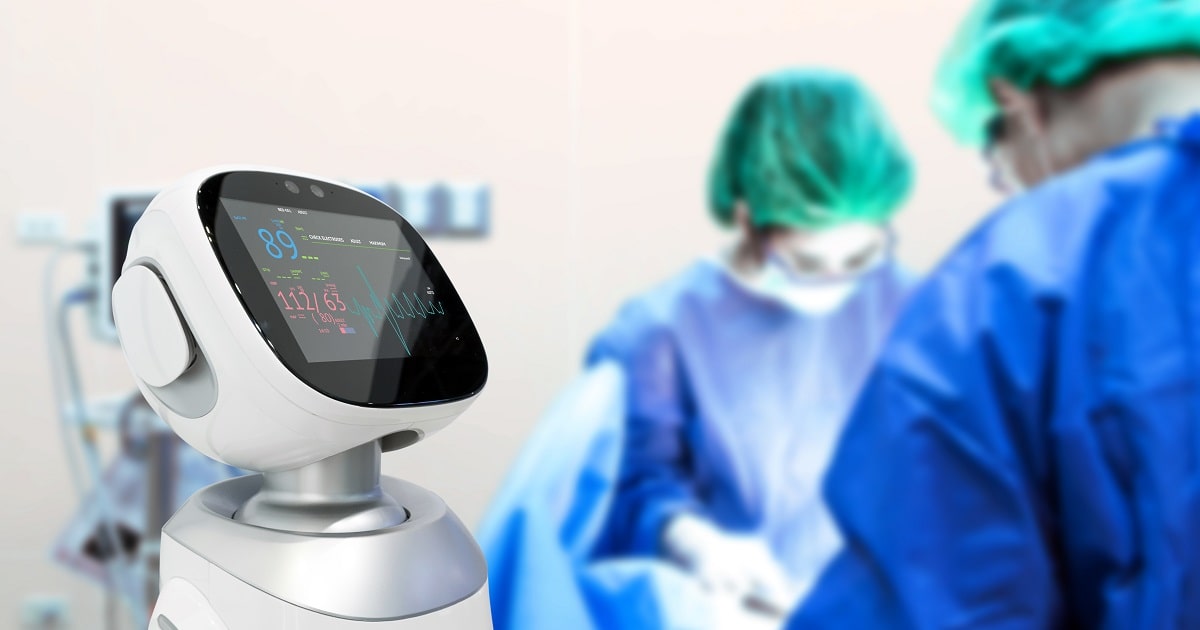
Health Technology, AI
Article | July 18, 2023
COVID-19 has been a catalyst for change, with the diagnostics industry taking centre stage and rising to the challenge of a global pandemic. One of the silver linings of this mammoth task has been the unprecedented time and focus dedicated to finding new technologies and solutions within the sector.
The lessons learned from the pandemic now need to be taken forward to improve breast and cervical cancer detection, prevention and treatment across the UK over the coming years.
In the more immediate term, the diagnostics industry, alongside public health leaders, faces a daunting backlog as screening programmes for breast and cervical cancer were put on pause for months. These two life-saving tests have been some of the most overlooked during the pandemic and getting back on track with screening is critical as we start to turn the corner. We believe innovation in diagnostics, particularly artificial intelligence guided imaging, is a key tool to tackle delays in breast and cervical cancer diagnosis.
The scale of the backlog in missed appointments is vast. In the UK, an estimated 600,000 cervical screening appointments were missed in April and May 2020. And an estimated 986,000 women missed their mammograms, of which an estimated 10,700 could be living with undiagnosed breast cancer. It is clear that hundreds of thousands of women have been affected as COVID-19 resulted in the reprioritisation of healthcare systems and resource allocation.
Both cervical and breast cancer screening are well suited for digital technologies and the application of AI, given both require highly trained medical professionals to identify rare, subtle changes visually –a process that can be tedious, time-consuming and error prone. Artificial intelligence and computer vision are technologies which could help to significantly improve this.
What does AI mean in this context?
Before examining the three specific areas where digitisation and AI can help, it is important to define what we mean by AI. It is the application of AI to medical imaging to help accelerate detection and diagnosis. Digitisation is the vital first step in implementing an AI-driven solution – high quality images demand advanced cloud storage solutions and high resolution. The better the quality of the input, the more effectively trained an AI system will be.
The first area where AI-guided imaging can play a role is workflow prioritisation. AI, along with increased screening units and mammographers, has the potential to increase breast cancer screening capacity, by removing the need for review by two radiologists. When used as part of a screening programme, AI could effectively and efficiently highlight the areas that are of particular interest for the reader, in the case of breast screening, or cytotechnologist when considering cervical screening.
Based on a comparison with the average time taken to read a breast screening image, with AI 13% less time is needed to read mammogram images, improving the efficiency with which images are reviewed. This time saving could mean that radiologists could read more cases a day and potentially clear the backlog more quickly.
For digital cytology for cervical cancer screening, the system is able to evaluate tens of thousands of cells from a single patient in a matter of seconds and present the most relevant diagnostic material to a trained medical professional for the final diagnosis. The job of a cytotechnologist is to build a case based on the cells they see. Utilising these tools, we are finding that cytotechnologists and pathologists are significantly increasing their efficiency without sacrificing accuracy to help alleviate the backlog of cervical screening we are seeing in many countries.
Prioritising the most vulnerable patients
Another key opportunity is applying AI to risk stratification, as it could help to identify women who are particularly at risk and push them further up the queue for regular screening. Conversely, it would also allow the screening interval for those women at lower risk to be extended, creating a more efficient and targeted breast screening programme.
For example, women with dense breast tissue have a greater risk factor than having two immediate family members who have suffered from breast cancer. What’s more, dense breasts make it more difficult to identify cancerous cells in standard mammograms. This means that in some cases cancers will be missed, and in others, women will be unnecessarily recalled for further investigation.
A simple way to ensure that those most at risk of developing breast cancer are prioritised for screening and seen more regularly would be to analyse all women on the waiting list with AI-guided breast density software. This would allow clinicians to retrospectively identify those women most at risk and move them to the top of the waiting list for mammograms.
In the short term, to help tackle the screening backlog, prior mammograms of women on the waiting list could be analysed using the breast density software, so that women at highest risk could be seen first.
Finding new workforce models
Being able to pool resources will allow resource to be matched to demand beyond borders. Globally, more than half a million women are diagnosed with cervical cancer each year and the majority of these occur where there is a lack of guidance to conduct the screening programme. The digital transformation of cervical screening can connect populations that desperately need screening to resources where that expertise exists. For example, developing countries in Africa could collect samples from patients and image these locally, but rely on resources in the UK to support the interpretation of the images and diagnoses. Digital diagnostics brings the promise of a ‘taxi-hailing’ type model to cervical cancer screening – connecting groups with resources (drivers with cars) to those who are in need (passengers): this is an efficient way of connecting laboratory professionals to doctors and patients around the world.
It’s going to take many months to get cancer screening programmes up and running at normal levels again, with continued social distancing measures and additional infection control impacting turnaround times. But diagnostic innovation is on a trajectory that we cannot ignore. It will be key to getting cancer screening programmes get back on track. AI is a fundamental piece of the innovation puzzle and we are proud to be at the forefront of AI solutions for our customers and partners.
Read More

Health Technology, Digital Healthcare
Article | August 16, 2023
Anesthesia groups face major challenges in the aftermath of the pandemic: Financially strapped hospitals are increasingly unwilling or unable to pay anesthesia subsidies, and a shortage of qualified anesthesiologists and CRNAs is making recruitment extraordinarily competitive.
The good news is that anesthesia opportunities are plentiful in the ambulatory surgery center (ASC) market. As more inpatient procedures migrate to ASCs, anesthesia practices can help meet demand by working with hospitals and ASCs. A dual-contracting approach can help increase revenue, reduce operational risk, enhance recruiting leverage, and present opportunities for equity investments in ASC ventures.
Expanding ASC Case Mix
Multiple factors are driving increased ASC volume.Consumers have long been attracted to the convenience andfast turnaround timesASCs offer, and as the pandemic began to take hold and patients worried about becoming infected in hospitals, theirpopularityincreased.
But even before the pandemic hit, theuse of ASCs was growing,with the number of centers increasing 7.1% annually since 2016.1No doubt this was in part driven by Medicare restricting fewer surgeries to the inpatient only (IPO) setting. This year alone, Medicare is adding 11 orthopedic procedures to the ASC-approved list, including total knee arthroscopy (TKA) and total hip arthroscopy (THA).2Commercial payersare alsofuelingASC volume by promotingthis venue as a lower-cost option to members.Lastly, with more than 90% of ASCs at least partially owned by physicians,providers themselvesare driving moreprocedures to this setting.
Hospitals Become ASC Buyers
For years, hospitals viewed ASCs as direct competition and discouraged or even prohibited inpatient anesthesia practices from contracting with them. But that dynamic is changing as more hospitals become buyers or majority investors.
According to a recent survey, the percentage of hospitals and health systems planning to increase their investments in ASCs rose from 44% in 2019 to 67% in 2020, with 75% of 200-plus-bed hospitals already owning more than one ASC.3Hospitals view these investments as a way to enhance physician relationships and increase surgical capacity.
The Benefits of Practice Diversification
For anesthesia practices that elect to contract with both hospitals and ASCs, a key benefit is improved profitability, since average ASC case reimbursements are higher than average hospital cases due to better payer mix and more efficient room turnover. Groups that work with multiple organizations also reduce their institutional or operational risk by limiting their exposure to potential financial problems associated with a single contracted entity.
Practices likewise gain an edge when it comes to recruiting in today’s highly competitive anesthesiologist and CRNA market. One of the chief benefits of ASC involvement is being in a position to offer a better work-life balance by spreading call responsibilities across a larger physician call pool. The math is simple: If a hospital group has seven physicians, each must provide call coverage once a week. But if the group also contracts with five ASCs and brings on five additional doctors to staff the facilities, individual call responsibilities are reduced to once every 12 days.
The importance of mitigating call duties to improve the work-life balance for both experienced clinicians and new hires can’t be overstated, particularly as hospitals work to streamline OR throughput by increasing the number of surgical procedures. Groups can also explore a range of creative compensation approaches, including essentially selling call opportunities to newly hired or recent graduate anesthesiologists as additional avenues to attract qualified clinicians while easing the burden on senior anesthesiologists.
Equity Opportunities
Among the most intriguing aspects of ASC involvement is the potential for becoming an equity stakeholder in the business. Surgeons traditionally have been the primary drivers in creating ASCs, but new opportunities exist for anesthesiology groups, particularly if their hospital is buying an existing ASC or developing a new ASC venture and looking to diversify the ownership group.
The idea of anesthesia ownership isn’t as crazy as it might sound. Like surgeons, anesthesiologists are integral to the success of an ASC, and like surgeons, they get there early and stay late. It’s no secret that joint ownership can greatly improve relations between the practice and the hospital, since both are now working toward the same objectives.
Groups can also make more money. I met with a surgical group not long ago with a 49% ownership stake in a hospital. That equity generated an additional $80,000 per year for each physician partner. How much you can make, of course, depends on your specialty, your level of ownership, and the volume of business. But you’ll never know until you try.
Outside Expertise
The pandemic has unleashed numerous changes throughout healthcare, and where the dust will eventually settle isn’t entirely clear. But what is certain is that for organizations to remain viable, they’ll need to be flexible and look hard at nontraditional business opportunities. Contracting with both hospitals and ASCs represents one such approach for anesthesia groups.
If you’re interested in exploring this and other business possibilities but don’t know where to start, Change Healthcare can help. Our team of expert anesthesia practice-management consultants have an average of 18 years’ experience in the specialty. We can be engaged on a per-project basis or we can provide our consultant services as part of our turnkey anesthesia-billing solution.
Our anesthesia revenue cycle management services can be deployed either on our own proprietary anesthesia-billing platform or on your hospital billing system. Either way, we’ll provide seamless, end-to-end service.
Read More

Health Technology, Digital Healthcare
Article | September 7, 2023
Do you know a friend or loved one who suffers from fear, anxiety, and depression and do not know what to do?
It can be difficult to watch someone you know struggle with their mental health and not be able to do anything about it.
As a result, here are 8 important tips on how to help the person you care about in these kinds of situations.
1. Learn as much as you can in managing anxiety and depression: There are many books and information that will educate you on how to deal with fear and anxiety. Share this information with the person who is struggling with their mental health.
2. Be understanding and patient with the person struggling: Dealing with depression and anxiety can be difficult for the person so do not add more problems than what is already there. Do not get into arguments with the person who is having a difficult time with their mental health.
3. Talk to the person instead of talking at them: It is important not to lecture the person who is struggling with anxiety and depression. Talk to the person about their issues without getting upset. Most people will listen if you approach them in the right manner.
4. Remind the person the importance of getting help: One way to convince the person who is struggling with fear and depression is to tell them what may happen if they don't get some assistance. Anxiety and depression can be difficult to manage and usually these mental health issues won't go away by themselves.
5. Find out why the person won't seek assistance: Address the issues on why the person will not get the necessary help. Many people who are struggling are fearful and frustrated. Try to find out the reasons why he or she won't get the help they need and then try to find ways that will overcome their resistance of seeking treatment.
6. Join a local support group: There are many mental health support groups in your area that can help you. Many hospitals, churches, and counselors in your area will be able to provide you with a list of groups. These mental health organizations will be supportive of your situation and they can give you additional advice on how to help the person who is struggling.
7. Talk to someone who has been there: Find somebody who used to struggle with fear, anxiety, or depression and have them talk to the person who is struggling. He or she could use their past experiences to try to reason with the person that you care about, and they might be able to use their insights to convince the individual to seek treatment.
8. Talk to a counselor: Talk to a professional counselor on how you can help your friend or relative with their mental health struggles. A counselor can give you advice and ideas on how to help out your friend. Your main goal is to get the person who is struggling to seek help from a mental health specialist.
Read More

Future of Healthcare
Article | December 8, 2020
Let’s face it. It’s been one tough year with too many of us sitting idle and indulging in calorie-laden foods for way too long as the coronavirus pandemic continues to sweep the globe. For all too many, sheltering in place has prompted unwelcome weight gain—a troublesome truth as we head into the holiday season where gluttony oft reigns supreme.
That said, many individuals did have foresight and motivation back in March and the months that followed, wisely leveraging that extreme downtime to “diet for dollars” with HealthyWage—a pioneer of money-driven weight loss contests and challenges for individuals, teams and business groups. In fact, those who started a 6-month HealthyWager challenge during the pandemic (late March through May) broke company records, spurring a dramatic increase in pound shedding success rates—and in-kind cash payouts—against the norm. So motivated became America to drop, or avoid, the so-called ‘quarantine 15’ and score some cold hard cash in the process, HealthyWage reports that this past May it logged a substantial year-over-year increase in challenge participants at large. This is not surprising given Google search trends indicates the portion of people searching for weight loss hit a 5-year high in May of 2020—a level even exceeding the quintessential New Year’s diet resolution season.
Beyond the fact that people who started weight loss wagers during the pandemic achieved much greater success as compared to participant results the prior year, and earning hundreds and even thousands of dollars for their efforts, it is women and individuals under 30 years of age primarily accounting for the sustained increases. For example, among the litany of pandemic era success stories, Lisa S. won over $1,900 for losing 50 pounds in 6 months while Hayden T. won over $1,200 for losing over 62 pounds in 6 months—both during the COVID-19 pandemic.
As the coronavirus rages on well into the fourth quarter, we collectively find ourselves again having to shelter-in-place. Those trying to reconcile how they will survive this next round of being home bound, and the holiday season at large, with mitigated waistline and budgetary wreckage—and who are even planning their New Year resolution approach just beyond—would be wise to consider the gamified dieting approach. “Loss Aversion is a powerful dynamic and the reality of having ‘skin in the game’ can propel the results of a gamified weight loss initiative,” notes HealthyWage co-founder David Roddenberry.
The efficacy of diet gamification is well-proven. For one, according to study findings published by JAMA Internal Medicine, behavioral economics-based gamification led to “significantly” increased physical activity among overweight and obese Americans. In this particular study, pairing a step tracking device with social incentives led to sustained, long-term behavior change—prompting participants to take more steps then with a step tracking device, alone. While the report explains that “gamification interventions significantly increased physical activity during the 24-week intervention,” with competition being the “most effective.”
That’s something HealthyWage has seen play out since launching its weight-loss gamification platform in 2009. HealthyWage is, in fact, founded on earlier substantive research and "double-incentivization" methodology that proves competition and rewards—especially the cash variety—can as much as triple the effectiveness of weight loss programs.
“A key element for the success of a gamification program is giving participants something to lose if they fail to meet their goal—whether tangible or intangible,” notes Roddenberry. “In this particular study, it was just points at stake but even this effected behavior change. There are actually throngs of studies demonstrated that the threat of losing something of value is much more effective than the opportunity to win something of equal value. That’s precisely why we advocate that program participants ‘pay to play’ and make an investment out of their own pocket in order to win rewards—in our case large cash prizes—for losing weight and getting more active in the program.”
A few other notable HealthyWager success stories (both female and male) are case-in-point. These include Jean N. who lost 71 lbs. and won $3,357.99 for her efforts, and Jeremy M. who also lost 71 lbs. and won $1,886.32 for his own slimdown success. From its website, HealthyWage.com shares yet more inspirational success stories of both women and men who gained financially for their pound-shedding achievements using the company’s unique gamification approach. This includes Kristin W. who lost a staggering 114 pounds and won $4,000 for her efforts, Anastasia W. who lost 41 pounds and won a whopping $10,000 in kind, and Blake S. who lost an impressive 151 pounds and won $4,670 for his own slimdown success. Figures that are tasty, indeed.
These and other such HealthyWage payouts are proof positive. For their weight-loss achievements that collectively exceeds an astounding 1,050,000 pounds for this year, alone—269 of which losing in excess of 100 pounds (and nearly 7.5 million pounds lost since the company’s launch), HealthyWage has reportedly paid more than xx30,000 dieters over $13 million cash in 2020, specifically, and over $55 million cash since its inception in 2009.
HealthyWage programs apply these principles:
HealthyWager Challenge: participants commit to a weight loss goal and an upfront financial payment and get their money back plus a financial return if they accomplish their weight loss goal. The average participant loses 40.7 pounds and gets paid $1,245.
HealthyWage Step Challenge: participants commit money and agree to increase their steps by 25% over 60-days. If they achieve their goal they get their money back plus the money from those who don't hit their goal.
Upholding the new findings while also further validating HealthyWage’s well-honed approach, an additional study published in the journal Social Science and Medicine continue to prove that money is an effective motivator to “increase both the magnitude and duration of weight loss.” The same hold true in business for staff wellness initiatives. Results from one study published in the Annals of Internal Medicine indicated that “Loss Incentive’ Motivates Employees to Take More Steps ,” finding that financial incentives framed as a loss were most effective for achieving physical activity goals.
As a prolific corporate and group wellness purveyor, since 2009 HealthyWage has worked with an array of hi-caliber participants on workplace and staff wellness initiatives, including Halliburton, ConocoPhillips and more than 25% of the largest school districts in the country. HealthyWage has, in fact, formally created competitive, money-motivated programs for more than 1000 Fortune 500 and other public and private companies, hospitals, health systems, insurers, school systems, municipal governments and other organizations throughout the U.S., and their program has been more informally run at more than 7,000 companies and organizations seeking to bolster staff health and well-being, and boost bottom lines in kind.
“Throngs of studies reiterate the importance of the 'stick' in the design of a wellness incentive program, whether for individuals at home or for employee groups,” Roddenberry says. “Many studies have demonstrated that the threat of losing something of value is much more effective than the opportunity to win something of equal value. That’s precisely why we advocate that program participants ‘pay to play’ and make an investment out of their own pocket in order to win rewards—in our case large cash prizes—for losing weight and getting more active in the program.”
Studies do consistently show that monetary incentives serve to enhance the effectiveness of, and duly complement, weight-loss programs of any and all sorts, especially when paid out quickly like HealthyWage’s various programs. For its part, HealthyWage reports that the average participant more than doubles their investment if they are successful at achieving their goal. The financial upside potential is impressive.
So, if this is the season when you would like to not only resolve to lose those extra lbs. but also actually achieve that worthy goal, consider a cash-fueled approach. It just might give you that extra dose of motivation that’ll truly help you stay the course, shed weight and make some extra money in the process. There’s no better time than right now to bank on yourself.
Read More